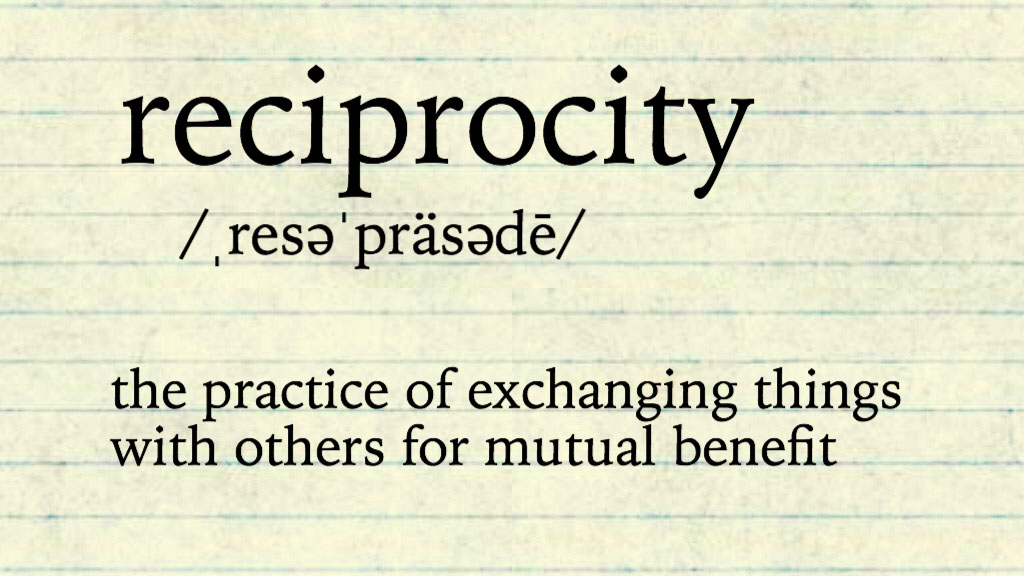How Leaders Can Harness the Power of Reciprocity And Three Reasons Why You Should
At Christmas your parents send you a card with a gift inside.
On your birthday, your significant other takes you to your favorite restaurant.
And when you do something particularly kind for someone, that person will feel she must do the same for you someday.
What is at work behind the scenes that makes us feel this way? Is it a cultural expectation we feel compelled to meet? Or is it just a normal human reaction activated by a strong emotional experience?
The word for this phenomenon is reciprocity.

It's in Our Nature
The original Latin root of the word reciprocity means "moving backward and forward." We get a sense of this when someone gives us a gift. Often with that comes a sense of debt.
You tell yourself that since Aunt Martha gave you a gift card to Amazon, you need to give her a gift from her favorite store when it's her birthday.
Or maybe when it's time for you to move, a few of your friends come over to help you load the truck. To free yourself of the obligation you feel, you treat them all to pizza and drinks for lunch. It may not be an even exchange, but it's way better than doing nothing.
We love it when people give us gifts
At Christmas, some of my customers would give me small gifts to show their appreciation.
Sometimes a cook from one the schools I delivered to would fix me a plate of food.
From time to time, my employer would feed us a meal when we had worked particularly hard.
It's natural for you to like people who give you stuff.
"Every gift from a friend is a wish for your happiness." - Richard Bach
Did you know you can lead someone to like you by simply asking him for a favor?
There's a phenomenon called the Ben Franklin effect. It states that you're more likely to do more favors for someone if you do the favor first rather than receive the favor. Ben discovered this when he wanted one of his adversaries to become a friend. This person had a book that Ben wanted to read. So he sent a note requesting to borrow the book for a few days. The man sent the book immediately. Ben returned the book the very next week. When they met face to face, the man was friendlier to Ben than he had ever been. The friendship that blossomed continued until the man's death.
Gifts create loyalty
It's easy to like someone when he or she is nice to you.
But what if you don't normally like that person? How can she win you over if you find her annoying, rude, or selfish?
Professor Dennis Regan did an interesting experiment at Cornell University in 1971. The participants thought they were there to evaluate art. Regan's assistant Joe would leave the room at the same time in each test. When he returned he would ask the participants if they would buy a raffle ticket to help him win a prize.
The more they liked Joe, the more tickets they bought. This isn't particularly surprising, is it?
What was really interesting was what happened when Joe returned with a Coke for the participants. When he did that, they bought twice as many tickets. Regan also discovered that it didn't matter how much they liked Joe when he brought them a Coke - the gift was enough to move them to purchase more.

"The manner of giving is worth more than the gift." - Pierre Corneille
Three reasons You should use the power of Reciprocity
When you present a welcome gift to someone, something magical happens.
The good feeling the gift brings gets associated with you.
So go ahead and be generous.
You don't have to encourage reciprocity.
When you are generous with other people, they will be generous with you.
It doesn't matter if it's something tangible. Maybe you do an act of service that helps someone. When you do something you didn't have to, you send a powerful message. "I'm in this for you."
Reciprocity removes the need for manipulation.
The one thing that hinders all persuasive efforts is resistance. Children resist their parents. Suburbanites resist telephone sales representatives. Employees resist their bosses.
When you create a positive association with yourself by being generous, you lower the other person's defenses. Then you won't engage in a tug of war like the one you see here.
"There is one word which may serve as a rule of practice for all one's life: Reciprocity." - Confucious
Now that you have a clearer picture of reciprocity, as well as three good reasons you should use it, consider this caveat.
Be absolutely sure you use this rule for the good of everyone involved.
When you use this rule with integrity, you'll never be seen as pushy, manipulative, or sleazy.
And besides, who wants that?
Now go and use your influence to make a better world for everyone.
Frank McKinley is the author of three bestselling books on leadership. He lives in Georgia with his wife, two children, and a Labrador Retriever.